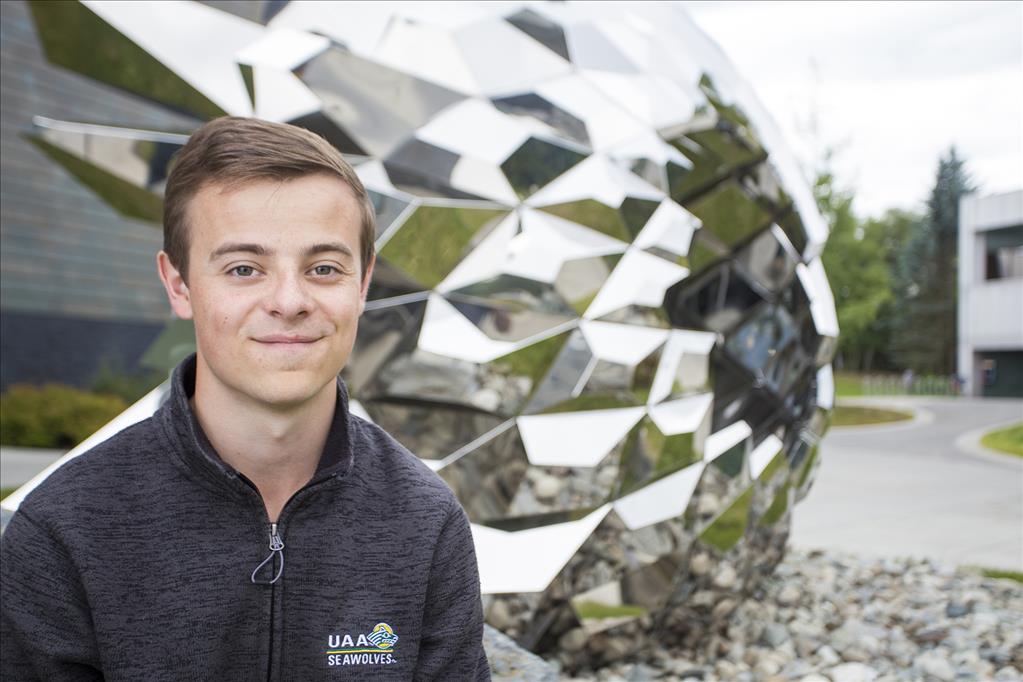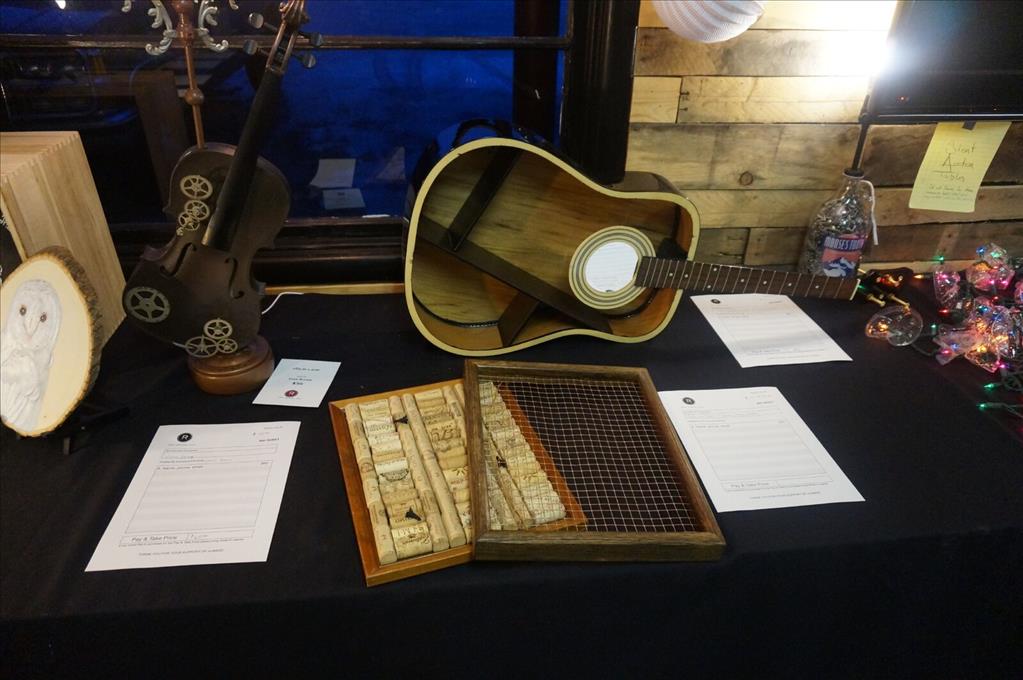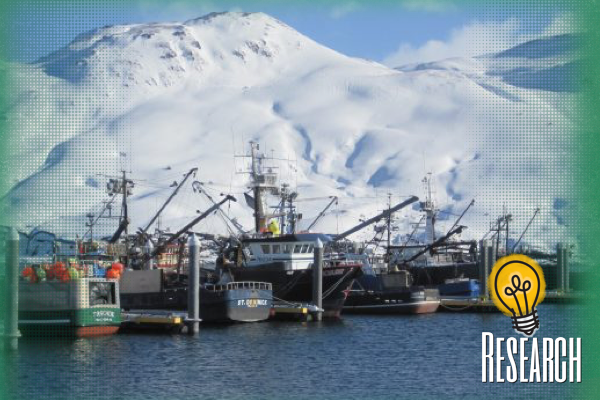A conversation with the creator of ‘Tables of Istanbul’
by Tracy Kalytiak |

UAA Professor Zeynep Kılıç created Tables of Istanbul, a 58-minute film exploring identity, culture and the rich world of cuisine in the historic melting-pot metropolis of Istanbul. (Photo by Philip Hall / University of Alaska Anchorage)
Zeynep Kılıç grew up in Turkey. Her mother is from Trabzon, a Black Sea city on the historical Silk Road. Her father was a native of Kahramanmaraş, a southern city in Turkey. Her parents' expectations led her to study economics at Middle East Technical University in Ankara, where she earned a Bachelor of Science degree in 1992. Then, she moved to New Jersey, where a chance encounter led to an epiphany: Sociology was her academic calling. Kılıç moved to Arizona, where she remained for 14 years, earning her master's and doctorate degrees at Arizona State University. She moved to Anchorage in 2008. A Fulbright U.S. scholar grant and sabbatical grant from the Institute of Turkish Studies brought her to Turkey in 2015-2016 to create a nearly hour-long film about food, identity and culture in Istanbul, Turkey. A UAA Innovate grant and a grant from the Turkish Cultural Foundation also helped fund her documentary, Tables of Istanbul, which was screened at the Beloit International, Canadian Diversity, Village of Brewster, Amsterdam Lift-Off, Delhi International and Seattle Turkish film festivals and the Huatulco Food & Film Festival; won recognition from the Hollywood International Independent Documentary Awards and IndieFest Film Awards; won Best Documentary at the Canadian Diversity Film Festival, and was a Viewers Choice winner at the 8th annual The Taste Awards, in Los Angeles. It will soon be shown at the Vancouver Turkish and Universe Multicultural film festivals. And, WKAR, Michigan State University's PBS station, will broadcast the documentary this year. Here, Kılıç discusses her life and the film, which will be shown in Anchorage on Saturday, March 25, at Alaska Wildberry Theater, 5225 Juneau Street, 6:15-9:15 p.m. Check out a long or short trailer for the film, and learn about tickets (and more) by visiting the event's Facebook page.

UAA Professor Zeynep Kılıç's film, Tables of Istanbul, will be screened at 6:15 p.m., Saturday, March 25, at Alaska Wildberry Theater, 5225 Juneau Street, Anchorage. In this photo, she cooks at home in Alaska, creating a dish called Hünkar Beğendi (Sultan's Delight) - lamb cooked long hours with tomatoes, onions and peppers, served over a bed of roasted eggplants mashed and cooked with butter, flour, milk and cheese and topped with parsley (Photo courtesy of Zeynep Kılıç)
What is sociology?
Sociology is the systematic study of human society. Hence, it gives you a lot of freedom and a wide range of topics. You can be studying religion, you can be studying sports, gender, race, income disparity, inequality, food, environment, anything you can imagine. I personally prefer studying contemporary issues, things that are happening now, and I usually study what I'm curious about.
What was the seed that grew into Tables of Istanbul?
When I was a brand-new immigrant in the United States, I thought cultural identity was a fascinating topic, and I still believe that it is a terrific subject of inquiry. At first I thought, 'Oh, I'm going to study Latin America.' Then people kept asking me questions about my own culture and I realized I don't really have an answer. So I ended up studying Turkish identity and my general area was immigration, belonging, citizenship and cultural identity because those were the things I was experiencing personally.

UAA Professor Zeynep Kılıç's Tables of Istanbul examines issues of food and cultural identity. Pictured, a Ramadan feast with the Usta family, with food cooked by Yadigar Usta (from Trabzon-Black Sea transplants to Istanbul). In the foreground is börek, a savory pastry with meat, cheese or veggie filling. (Photo courtesy of Zeynep Kılıç)
What happened to that course of thought when you moved up here in 2008?
I found myself thinking about the climate here, the way you should eat and all the things I love cooking with, that just don't exist here - the produce is either in bad shape by the time it makes it up here, or too expensive, or has to be transported from California or Mexico, which has heavy environmental cost. Those things initiated the question: What if I didn't cook Turkish? That felt very emotionally charged to consider, that I should just cook for the climate I'm in, be a salmon and root-vegetable-eating girl. And I had immense emotional resistance to that idea. I was thinking about this more so than my research agenda at the time. I decided to switch my focus. I am lucky because sociology gives me the flexibility to study a wide range of topics. However, this is really not smart strategy for any scholar because usually you want to build expertise in one area and stick to it because you know everything about it. I switched pretty much at the beginning of my career, in the middle of my tenure clock, so it wasn't the smartest thing but it was exciting. It's basically relevant to what I'm thinking at night, and at home, and that keeps me engaged in my research.

UAA Professor Zeynep Kılıç visited a variety of families in Istanbul while creating her film, Tables of Istanbul. Here, she has dinner with the Polatdemir family, cooked by Kezban Polatdemir, left. The family migrated to Istanbul from Adıyaman, a city in southeast Turkey. (Photo courtesy of Zeynep Kılıç)
How did you develop your inquiry once you decided to explore your Turkish identity and how that identity and food intertwine?
Initially I was curious about my emotional connection to my homeland foods. Then as I dug deeper, I realized I carry the burden of cultural representation about these foods yet I am not that knowledgeable about them. My experience in an urban, middle-class family with roots in the Black Sea and south of Turkey defined my understanding of Turkish cuisine, but that is a limited context compared to the larger Turkish culinary framework. Naturally I wanted to know what it was all about, and if my questions about identity and food connection stemmed from my immigration process or if that was simply a universal dilemma. Would similar questions be present if I went back to Turkey? What about domestic migrants there? Do similar concerns exist for all kinds of migrants, even when the move is within the same country? In the movie I start by asking people, 'What is this thing called Turkish cuisine? Can we even define it, given the fact that Turkey, especially Istanbul, is ethnically quite diverse? What differentiates Istanbul cuisine from the rest of the country?' And how does our socioeconomic standing shape our identity at the table?
What role did 'cooking Turkish' play in your life after you moved to the U.S.?
When people came over, I would always cook Turkish. I thought, Why am I doing this? Am I trying to be exotic for them so I'm more likeable, more interesting?' Or did I think I was doing what they wanted me to do, because they would think it would be more interesting to eat Turkish? All those things started swirling around in my head. I was mortified with the possibility of self-exoticization.

UAA Professor Zeynep Kılıç's Tables of Istanbul examines issues of food and cultural identity. Pictured are patlıcan and biber dolma - stuffed eggplant and bell pepper, made from eggplants and peppers dried during summer. Kezban Polatdemir cooked the dish. (Photo courtesy of Zeynep Kılıç)
Describe your experience about food.
My critical scholar self is always thinking about power, and is very critical about how culture gets appropriated, even through food. But my emotional immigrant self is all mushy, as in, "Yay, baklava!" This really irritates me: Who is this woman! I don't particularly like that self image but the funny thing is, everybody else loves that woman. I feel like in the U.S., I have gotten my network through Turkish food. I seduce people with my food. Nobody ever turns me down. So it has always been an extremely useful tool and strategy for me because it has made me very interesting and desirable for North Americans to add to their social network. That's how I stood out and made people notice me. Otherwise I had a very typical immigrant story - arrived in New York City with $100 cash, my bachelor's diploma and a single suitcase in 1993, not knowing a single soul. Turkish foods kept me connected to my old home while also creating bridges with new friends in my new home. It has fueled my journey by nourishing body and soul simultaneously.
And where did those thoughts lead you?
To questioning: What is this thing that seems to be so central to my life, but I don't necessarily evaluate it critically as much? I thought, I can write a paper about it. Food is a subject everybody thinks about. It's currently a global hot topic. I thought it required a more mainstream approach where a lot of people can be part of the conversation rather than a small conference crowd. And that it would require a more creative approach.
 UAA Professor Zeynep Kılıç's Tables of Istanbul examines issues of food and cultural identity. Here, Kılıç smells sage in Istanbul's
famous Spice Market
UAA Professor Zeynep Kılıç's Tables of Istanbul examines issues of food and cultural identity. Here, Kılıç smells sage in Istanbul's
famous Spice Market. (Photo courtesy of Zeynep Kılıç)
How did your experience in Alaska influence what happened next?
I was feeling isolated up in Alaska. I have a partner, I have my brother here, I have friends here, so it's not like I'm lonely. But nevertheless it was a difficult transition: the darkness, the really long winters, everyone being überathletic and outdoorsy. I just felt like I didn't fit in here. I'm very urban, and this was the smallest place I'd ever lived. I was having a hard time and it just felt like, I want to do something different but I just didn't know what that was. I explored ideas through one of the women's groups I'm a part of. I decided doing something creative as part of a team would give me the most pleasure and re-energize my feelings about where I am.
What led you to decide to make a film?
I cofounded a 501(c)(3) when I was in grad school called the Bosphorus Art Project; we organized film festivals, book events, published a digital arts and culture magazine called the BAP Quarterly. When I was in college I volunteered at film festivals. I always loved the arts but I only thought of it as liking movies as an extracurricular activity, nothing more. In the fall of 2012, I was searching for documentaries to show in class and came upon this 20-minute short movie made by a Turkish anthropologist, Zeynep Devrim Gürsel, about Turkey's accession into the European Union (Coffee Futures). She was using coffee ground reading as a way of predicting Turkey's accession into the European Union. It was really fascinating taking a political idea and something so culturally specific, a daily mundane activity people just do for fun, and juxtaposing the two, revealing the ridiculousness in the process. She had 50 different people read the coffee grounds and be like, "Oooo, in three months' time, you're knocking at the door of a very handsome guy." That guy would be the EU. As I was watching, I thought, here's an academic and she took a really fun and interesting subject and applied it to something that seems boring. Most people wouldn't even bother to think about the possibility of Turkey in the EU but they'd probably watch this movie, and learn something interesting in the process. So I thought, Huh, could I make a movie and approach my topic from a different angle?

Kezban Polatdemir made this lahmacun - flatbread with spicy and aromatic ground-beef topping. (Photo courtesy of Zeynep Kılıç)
What steps did you take?
I am part of a writing group - "Full Monkey, Hungry Bear" - on campus with Drs. DeFeo and Maseda, and wrote a proposal for them, trying to sell the idea of a movie in an academic context. They gave me feedback. But I had to find money. My best friend's in the broadcasting industry in Turkey, so I have a connection there. When I went for preliminary fieldwork, I met with her and a production company to establish the budget, the timeline, if we could do it and who would work on it with me. I started writing grants to secure $50,000 required to make it. So from the idea to the premiere, it took me exactly three years, five months and two weeks to make this movie.

Tables of Istanbul movie poster
What ideas did you want to delve into?
Conceptually, I decided I was going to have four types of interviews: I was going to look at people who did food as business, so chefs, restaurateurs. Then food as idea: people who write about food, bloggers, cookbook authors, food researchers. And then food as cause, so [nongovernmental organizations] and activists working on food issues. Then I thought it would be relatable to have interviews representing food in daily life, and to see people at their dinner tables. Istanbul is very diverse, and receives a lot of migrants. Population estimates for the city range from 17 to 20 million. I picked the categories that are most typical of the groups that live in or migrate to Istanbul. For example, a white upper-middle-class Turkish family with ethnic roots in the Balkans and who had been in Istanbul for generations. We were guests of an Istanbulian Greek family, an Armenian family, a family from the Black Sea, another from southeast Turkey. They're not meant to be generalized, they are more like snapshots of the kinds of families that exist in Istanbul, which is why it's called Tables of Istanbul.
Why did you want to include that element in your film?
I'm curious to see how and if tables differ across ethnicity, cultural or religious belonging, and social class. What's the function of the dinner table in terms of identity? The chefs and restaurateurs included are people who represent the public face of Turkish food - or foods of Turkey, as it is not meant as a rigid ethnic descriptor, but rather, as a geographical destination - especially in the global north, where there are articles in The New York Times, Food & Wine, etc. I also chose chefs that really articulated a specific point of view about whether it's Anatolian cuisine, Istanbul cuisine, new Anatolian cuisine - in other words, they weren't just Istanbul chefs cooking French food with French techniques. They were specifically using local produce, even local culinary techniques, Turkish recipes and perhaps elevating it to fine dining. I interviewed people I see as discourse setters. They are the "Who's Who" of food not only in Istanbul, but Turkey as well. What they say gets discussed, or written up. In other words, beyond a few family dinners, I did not talk to people on the street about their dining practices, and that was intentional. This is a methodological choice I am making by understanding how food and identity get discussed among chefs, activists and food writers. In the movies, this perspective gets enriched by the inclusion of the family dinners, my chats with my Turkish and American families in Alaska and in Turkey, especially with my mom. And these intimate conversations make the movie more relatable, I believe.

UAA Professor Zeynep Kılıç's Tables of Istanbul examines issues of food and cultural identity. Magda Masanoviç prepared this barbunya, an Istanbul Greek-style bean dish. (Photo courtesy of Zeynep Kılıç)
What's the backdrop?
I'm not a historian, it's not teaching you about Istanbul's history of food by any means or deciphering certain recipes, but it has a little bit of everything in it. It's talking about the imperial background of the city, how that affected food cultures today, environmental concerns, food security, the culture of food, how Istanbul fits in with the rest of the country, the migration into the city, the Syrian refugees ... it's an exploratory approach that feels like a little bit of everything and the kitchen sink. But that is how food is: It touches upon everything from history and science, belonging and identity, to technique and emotion.
Written by Tracy Kalytiak, University of Alaska Anchorage
 "A conversation with the creator of ‘Tables of Istanbul’" is licensed under a Creative Commons Attribution-NonCommercial 4.0 International License.
"A conversation with the creator of ‘Tables of Istanbul’" is licensed under a Creative Commons Attribution-NonCommercial 4.0 International License.














